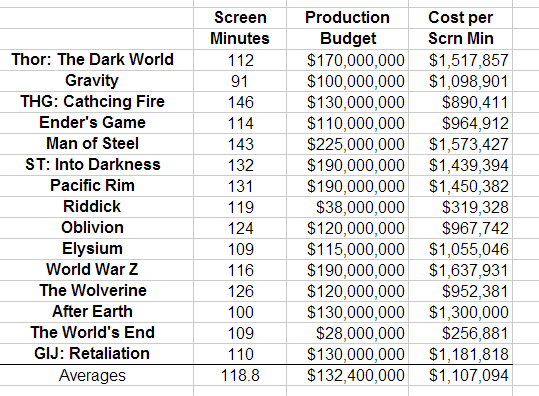Okay, All,
Here's the chance to get back at that obnoxious Spec Script writer asshole that thinks he's going to change Holloywood with his very first script. Have your fun!
(1) I have reduced my script from 350 pages to 145. I am fairly sure I can get it to 130 pages ...but at 120 pages shit will get confused or the overall meaning is compromised. Is 130 pages that far off? Is that so much as to raise a red flag? ...Does 129 carry the psychological advantage of keeping it in the 120's?
(2) Science Fiction Technology: I have several new hi-tech devices in my screenplay. My question is do I give them a capital letter in my action blocks? Example: Do I write; "Fred puls out his Commatron and blows away the Proteus Deflector." ...or... "Fred pulss out his commatron and blows away the proteus deflector."
(3) I have a "Biblical Quote" I want to appear at the beginning (white text over black background. I would like to see an example of how this should be handled. I have seen several different versions online, but they seem confusing at best.
(4) After the credits have rolled I want to include a quick basic scene that sneaks in showing a flower. yah, I know, I know. I have zero camera commands in my script. Do I "FADE OUT" and then "FADE IN" again? What's the best way?
(5) I have nameless alien characters (Penatrons) that have assumed the bodies of some human characters in the script. The human characters have already been introduced. Here's my problem: Let's say ROBERT gets assimilated by a Penatron. When Robert was talking previously I always just used: ROBERT
...Now that he's dead and a Penatron has assumed his body, I am forced to write him in like this:
ROBERT (AS A PENATRON) ...or... ROBERT (PENATRON).
What I'm running into is a lot of space is getting used up adding in their assimilated names into the action script. Here's an example:
Robert (as a Penatron) grabs a plasma blaster and kills Billy (as a Penatron). Rodney (as a Penatron) and Mathew (as a Penatron) grab their plasma blasters and incinerate Robert (as a Penatron).
You get the point. All this (as a Penatron) crap is eating up space. What I did was each time a character was assimilated I qualified it within the script:
A Penatron kills Robert and assumes his body - ROBERT(P). Two more Penatrons kill Rodney and Mathew and assume their bodies as well - RODNEY(P) and Mathew(P).
Is this a good idea? Is there a better way to handle this?
Thanks for the help!
-Birdman
P.S. The examples I have given are not in my script. They are just hi-tech names I'm using for example.
Here's the chance to get back at that obnoxious Spec Script writer asshole that thinks he's going to change Holloywood with his very first script. Have your fun!
(1) I have reduced my script from 350 pages to 145. I am fairly sure I can get it to 130 pages ...but at 120 pages shit will get confused or the overall meaning is compromised. Is 130 pages that far off? Is that so much as to raise a red flag? ...Does 129 carry the psychological advantage of keeping it in the 120's?
(2) Science Fiction Technology: I have several new hi-tech devices in my screenplay. My question is do I give them a capital letter in my action blocks? Example: Do I write; "Fred puls out his Commatron and blows away the Proteus Deflector." ...or... "Fred pulss out his commatron and blows away the proteus deflector."
(3) I have a "Biblical Quote" I want to appear at the beginning (white text over black background. I would like to see an example of how this should be handled. I have seen several different versions online, but they seem confusing at best.
(4) After the credits have rolled I want to include a quick basic scene that sneaks in showing a flower. yah, I know, I know. I have zero camera commands in my script. Do I "FADE OUT" and then "FADE IN" again? What's the best way?
(5) I have nameless alien characters (Penatrons) that have assumed the bodies of some human characters in the script. The human characters have already been introduced. Here's my problem: Let's say ROBERT gets assimilated by a Penatron. When Robert was talking previously I always just used: ROBERT
...Now that he's dead and a Penatron has assumed his body, I am forced to write him in like this:
ROBERT (AS A PENATRON) ...or... ROBERT (PENATRON).
What I'm running into is a lot of space is getting used up adding in their assimilated names into the action script. Here's an example:
Robert (as a Penatron) grabs a plasma blaster and kills Billy (as a Penatron). Rodney (as a Penatron) and Mathew (as a Penatron) grab their plasma blasters and incinerate Robert (as a Penatron).
You get the point. All this (as a Penatron) crap is eating up space. What I did was each time a character was assimilated I qualified it within the script:
A Penatron kills Robert and assumes his body - ROBERT(P). Two more Penatrons kill Rodney and Mathew and assume their bodies as well - RODNEY(P) and Mathew(P).
Is this a good idea? Is there a better way to handle this?
Thanks for the help!
-Birdman
P.S. The examples I have given are not in my script. They are just hi-tech names I'm using for example.
Last edited:






